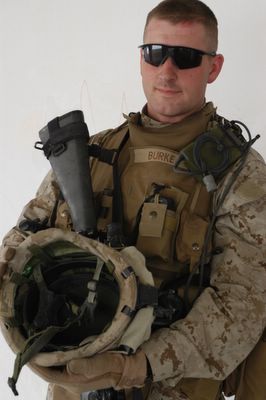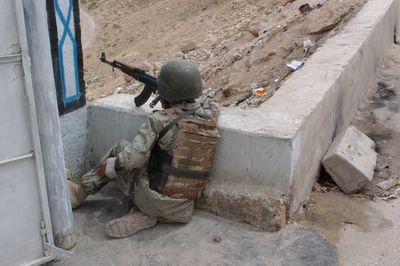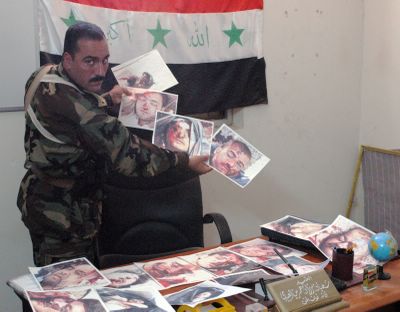IRAQ (JUNE 2006) – In the wake of Abu Musab al-Zarqawi’s death this month, conditions in Baghdad and across Iraq remain violent.
Col. Michael F. Beech, a Worcester native, commands the 4th Brigade Combat Team, 4,300 soldiers conducting military and civil operations in central and southern Baghdad.
On average, five to seven attacks occur each day in 4th BCT’s area, and the death of al Zarqawi has not significantly changed that, Col. Beech said.
“I wouldn’t expect the death of Zarqawi to have an immediate effect on attack levels in a small particular area, but it’s certainly had a disruptive effect on the network at large in terms of ability to plan, coordinate and carry out attacks in the future,” he said.
One part of his sector, the al Dora district, which has a power plant, oil refinery and sewage treatment plant, is among the city’s most violent neighborhoods.
One of Saddam Hussein’s defense lawyers was taken from his home in Dora in June, and killed. His wife said the abductors wore Iraqi police uniforms, and carried identity cards from the Ministry of the Interior.
That’s disheartening in light of Col. Beech’s assessment that conditions in al Dora had been improving.
“People were being targeted there,” he said. “Sunni insurgents would target Shia, and Shia militia were targeting Sunnis. In the past couple weeks we have made some progress in the al Dora market. After the Samarra shrine bombing in February, it was on the verge of closing. In April, 50 percent of the stalls were empty. I walked through there yesterday,” Col. Beech said two weeks ago, “and that market is 100 percent better.
“There’s a perception that the security situation is improving in Dora,” he said.
Other American commanders and administration officials also say conditions in Baghdad are improving.
Despite these postulations, conditions seemed to have grown worse in terms of security and quality of life for Iraqis compared with two previous visits to Iraq.
On those trips, the Dora power plant had two of four burners operating, computer controls not functioning, and the furnaces using crude oil, diesel or propane depending on what was available, producing six to eight hours of electricity a day.
Since then, the plant has brought a third burner online, but electric output has dropped to three to six hours of power a day.
Col. Beech said that’s because the plant machinery has continued to deteriorate, foreign contractors are reluctant to work on it because of violence, and the power is being spread among more neighborhoods.
He said that one local response has been the appearance of local entrepreneurs who wire houses into small electric generators, and start them up when the power plant shuts down. Each house on the mini-grids gets an average of 3 amps of power.
The city is – to say the least – a huge change from the quiet Tatnuck neighborhood where Col. Beech grew up.
His family lived on Mower Street, and he went to West Tatnuck Elementary and Middle schools, Doherty Memorial High, and then Norwich University in Vermont, a military school, where he graduated with honors.
He and his wife, Kathleen Earley, met in high school. She grew up on Vassar Street off Newton Square, where her mother, Roseanne, still lives. Col. Beech’s parents – Jim and Peggy Beech, live in Centerville on Cape Cod. Col. and Mrs. Beech now live at Fort Hood, Texas.
The commander of 4th BCT used to deliver the Telegram & Gazette as a boy; his brother, David, worked on the newspaper’s loading dock.
He and his wife – then girlfriend – used to babysit for a child named Tim Murray, who grew up to become mayor of Worcester.
“Say ‘Hi’ to him for me,” Col. Beech said.
Col. Beech has deployed widely, including tours in Bosnia and Panama. This is his first deployment to Iraq.
“My brigade – the 4th Brigade Combat Team – is responsible for conducting counterinsurgency operations and training Iraqi security forces in central Baghdad and southern metropolitan Baghdad, including the International Zone and the Rasheed District,” Col. Beech said.
His forces are partnered with several Iraqi Army and Iraqi Police brigades, and also work with district councils in the Rasheed, Karadah and Karkh neighborhoods of Baghdad.
Counterinsurgency operations include collection of intelligence; reconnaissance to identify locations of cell members; cordon and searches and raids to find caches of insurgent materials such as bomb making equipment, weapons and mortars; arrest and capture of insurgents; training of Iraqi security forces and Iraqi police; and building essential services such as water and sewer projects, Col. Beech said.
“The focus of everything we’re doing in my area is protecting the local population from the insurgents, be they criminal elements or insurgents preying on certain aspects of the local population. Certain groups target Shia minorities, some target Sunni people, so a lot of what we do is simply protecting the population, much like you would think of neighborhood police, working with Iraqi police and local police,” he said.
Col. Beech said his soldiers have good morale and a strong sense of mission, evidenced by high reenlistment rates – 172 percent of target, or 222 compared with a goal of 129 – among initial term soldiers, those in their first enlistment.
Of the brigade’s 4,300 soldiers, 14 have been killed since deploying to Iraq in January.
“The death of Zarqawi was celebrated by a lot of Iraqis, and it brings a lot of relief to a lot of people because that particular individual and his associates have brought a lot of suffering to people of Iraq,” Col. Beech said.
“Also, the minister of defense and minister of interior positions were filled, the last two ministerial positions to be filled in the new government, so people hope government can be more sustaining of their security forces,” he said.
“A lot of folks are cautiously optimistic,” he said.
“With two ministers in position, they have an opportunity to take a leading role in providing security. Iraqi security forces are now responsible for controlling 60 percent of Baghdad. Even in areas where they’re not running their own security ops, I have Iraqi partner units conducting operations with me every day,” he said.
The 5th Iraqi Brigade that is partnered with 4th BCT has relatively few pay problems – 15 soldiers out of 2,200 had problems in one recent pay period, Col. Beech said.
The Iraqi Police units partnered with 4th BCT have more problems with getting pay, he said, and as the number of police increase, he expects pay problems also will rise.
“They’re trying to increase the number of Iraqi Police in Rasheed and in al-Dora, and pay is one of the things the new government is going to have to address. That’s capability at the ministerial level. I can certainly train a battalion to do its job every day, but government has to perform those activities we take for granted – pay, medical care, training and supply, the institutional pieces of our army,” Col. Beech said.
“Things in our army we take for granted – repair parts, fuel, replacing equipment when it’s battle lost – those types of sustainment functions, those are the kind of things that need to be fixed for Iraqi security forces to take the lead,” he said.
“They’re certainly going to have to focus their efforts on key areas of sustainment – pay, medical, repair and regeneration of equipment lost to combat, fuel and repair parts. If they can do those things, I think they’ll come along pretty well,” he said.
“At my level I don’t have interaction on the ministerial level, I see how it plays out on the ground. Certainly my Iraqi Army unit is further along than my Iraqi Police unit
“The 5th Iraqi Army Brigade, commanded by Gen. Mohammed, was formed well over a year ago, and reached full operational capability back in February, from a personnel, equipment and readiness perspective, capable of operating on their own and conducting operations independent of us. We still operate together to take advantage of our own particular strengths,” he said.
Col. Beech cited one operation in a Baghdad neighborhood where the U.S. forces were attacked by small arms fire.
“It was a densely settled neighborhood, with lots of homes. What we decided to do, I formed the outer cordon, provided counter-mortar, some aerial recon capability, and Gen. Mohammed conducted the inner portion, and went through the target homes. We were in and out of the target area in a couple of hours,” Col. Beech said.
“The thing that worries me the most is not the attacks on U.S. forces and not attacks on Iraqi security forces. The things I’m most concerned with is attacks by insurgent groups on unarmed civilians in the streets, such as market place bombs. Those are things that concern me the most, sectarian-based attacks where groups are trying to foment civil war between Shias and Sunnis. That’s the part that worries me the most,” he said.






